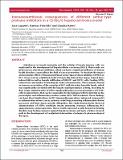Por favor, use este identificador para citar o enlazar a este item:
http://hdl.handle.net/10261/180601COMPARTIR / EXPORTAR:
 SHARE SHARE
 CORE
BASE CORE
BASE
|
|
| Visualizar otros formatos: MARC | Dublin Core | RDF | ORE | MODS | METS | DIDL | DATACITE | |

| Título: | Immunonutritional consequences of different serine-type protease inhibitors in a C57BL/6 hepatocarcinoma model |
Autor: | Laparra, José Moisés CSIC ORCID; Fotschki, Bartosz; Haros, Monika CSIC ORCID | Palabras clave: | Hepatocarcinoma Serine-type protease inhibitors Macrophage Innate immunity Immunonutrition |
Fecha de publicación: | 22-ene-2019 | Editor: | Impact Journals | Citación: | Oncotarget 10(7): 760-772 (2019) | Resumen: | Imbalances in innate immunity and the activity of innate immune cells are implicated in the development of hepatocellular carcinoma (HCC). Plant seeds are good sources of protease inhibitors, which can have a significant influence on human health disorders, especially in the field of cancer prevention. To elucidate the impact and preventive effects of immunonutritional serine-type protease inhibitors (STPIs) on HCC, it was used an established model of chemically induced liver injury. Injured livers induced Akt as well as hepatic infiltration of NKG2D+ and CD74+ cells. Feeding STPIs reduced size and number of intrahepatic nodes of mononuclear. These animals showed an inverse association of the severity of HCC with bioactive hepcidin levels, which was significantly correlated with the hepatic myeloperoxidase activity. According to their origin, administration of STPIs significantly induce increased numbers of F4/80+ cells in injured livers that can be responsible for the biological effects detected on the parenchyma and inflammatory markers under DEN/TAA treatment. These findings can have direct implications in HCC immunotherapy where enhanced response(s) in inflammation-driven cancer patients could help promoting inflammation-driven processes and favor tumor growth. Altogether, this study demonstrates that oral administration of STPIs modulate innate immunity response influencing HCC aggressiveness and progression. These results represent a path forward to develop durable, long-lasting response against hepatocarcinoma and open a future research path in the development of coadjutant intervention strategies to pharmacological therapies. | Versión del editor: | https://doi.org/10.18632/oncotarget.26605 | URI: | http://hdl.handle.net/10261/180601 | DOI: | 10.18632/oncotarget.26605 | E-ISSN: | 1949-2553 |
| Aparece en las colecciones: | (IATA) Artículos |
Ficheros en este ítem:
| Fichero | Descripción | Tamaño | Formato | |
|---|---|---|---|---|
| Oncotarget2019-Laparra.pdf | Artículo principal | 2,74 MB | Adobe PDF |  Visualizar/Abrir |
| OT2019- Laparra manuscript.pdf | Postprint | 720,14 kB | Adobe PDF |  Visualizar/Abrir |
CORE Recommender
PubMed Central
Citations
9
checked on 09-abr-2024
SCOPUSTM
Citations
12
checked on 24-abr-2024
Page view(s)
216
checked on 24-abr-2024
Download(s)
172
checked on 24-abr-2024
Google ScholarTM
Check
Altmetric
Altmetric
Artículos relacionados:
NOTA: Los ítems de Digital.CSIC están protegidos por copyright, con todos los derechos reservados, a menos que se indique lo contrario.
